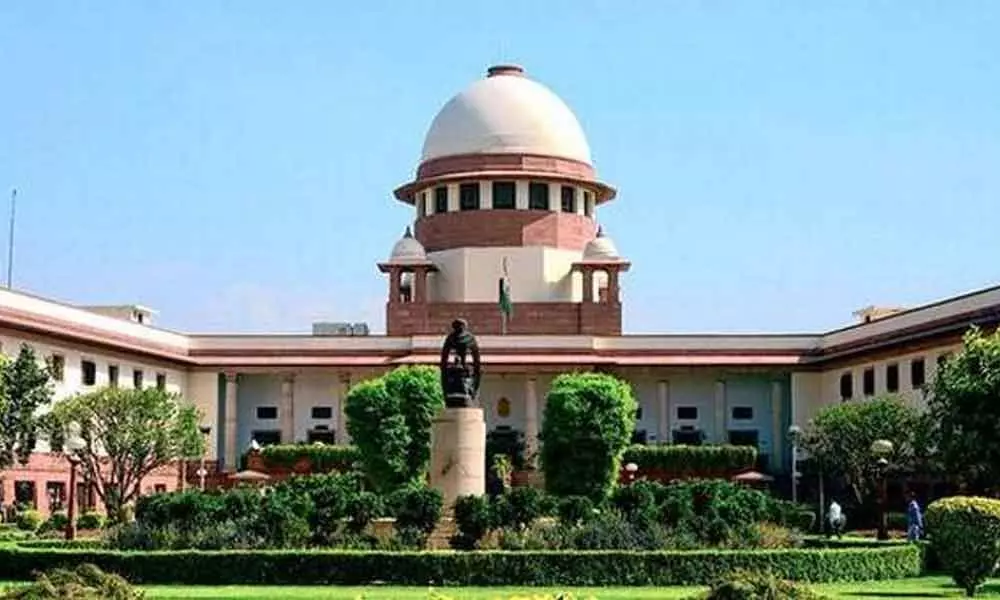Live
- Skills for the future: Adapting education to meet employability demands
- Breaking a Century-Old Rule: How Garg’s Team Challenges Bredt’s Rule in Organic Chemistry
- Neha Bhasin rocks with her debut rap song
- Moong Dal Ki Kachori: A delightful crispy treat
- Vivo Warns the Risks of UV-Cured Screen Protectors; Check Vivo's Recommendations
- BJP, Congress turncoats in AAP's first list
- Adani tried to enter Delhi's power sector: AAP's Sanjay
- International Kabaddi Federation sanctions World Super Kabaddi League 2025
- Pollution crisis fuels demand for CNG, BS-6 vehicles during wedding season
- Solar panels empowering UP farmers, says Yogi
Just In
Ayodhya Verdict: Supreme court rejects all 18 review pleas


The Supreme Court on Thursday has rejected all the review pleas filed by various parties in connection to the Ayodhya Verdict.
New Delhi: The Supreme Court on Thursday rejected a batch of petitions seeking review of the Ayodhya land dispute verdict which was pronounced on November 9. The verdict, that was the longest-pending land dispute in India cleared the way for construction of a Ram Temple at the disputed site.
The in-chamber bench was headed by Chief Justice S A Bobde, comprising a team of Justices D Y Chandrachud, Ashok Bhushan, S A Nazeer and Sanjeev Khanna. In the team, Justice Khanna was the only judge who was not a part of the 5-judge Constitution bench that had initially delivered the historic verdict.
Justice Khanna replaced the then Chief Justice of India Ranjan Gogoi, who retired on November 17 this year after pronouncing the significant verdict.
Ayodhya Verdict
A five-judge bench, headed by the then Chief Justice of India Ranjan Gogoi, had in a unanimous verdict decreed the 2.77 acre disputed land in favour of deity 'Ram Lalla'. The bench directed the Centre to allot a five-acre plot to Sunni Waqf Board to build a mosque in an alternate location Ayodhya.
Post the verdict, the SC received 18 review petitions to review the verdict from various parties - both from Muslim and Hindu side. The bench rejected all the 18 review petitions in-chamber. Nine of the pleas were filed by parties who were part of the earlier litigation and the other nine were filed by "third parties".
Review Pleas:
The first plea seeking review was filed on December 2. It was filed in the apex court by Maulana Syed Ashhad Rashidi, legal heir of original litigant M Siddiq and also the Uttar Pradesh president of the Jamiat Ulama-e-Hind.
Subsequently, on December 6, six petitions were filed in the apex court seeking review of its November 9 judgement.
On December 9, two more review petitions were filed, one by the Akhil Bharat Hindu Mahasabha and the other by 40 persons, including rights activists who have jointly moved the court seeking review of its verdict.
Maulana Syed Ashhad Rashidi had sought review of the verdict on 14 counts and said that "complete justice" could only be done by directing reconstruction of Babri Masjid.
Akhil Bharat Hindu Mahasabha, which had sought a limited review of the November 9 verdict, has moved the court against the direction to allot a five-acre plot to Sunni Waqf Board for building a mosque in Ayodhya. It had also sought deletion of findings declaring the disputed structure as a Mosque.
Historian Irfan Habib, economist and political commentator Prabhat Patnaik, activists Harsh Mander, Nandini Sundar and John Dayal, said they were "deeply aggrieved" by the verdict as it "errs in both fact and law" while filing their pleas.

© 2024 Hyderabad Media House Limited/The Hans India. All rights reserved. Powered by hocalwire.com






